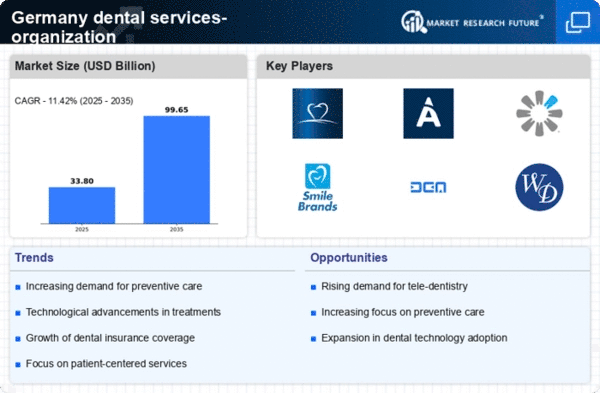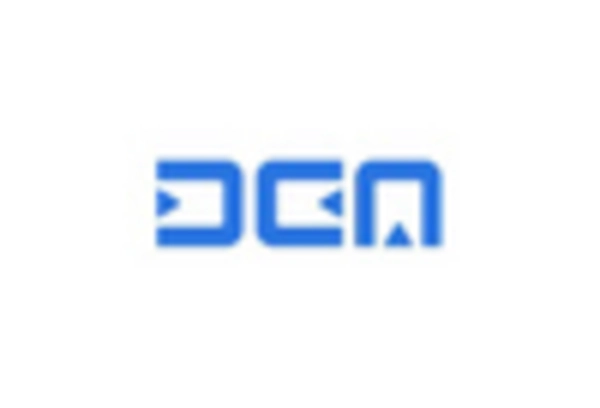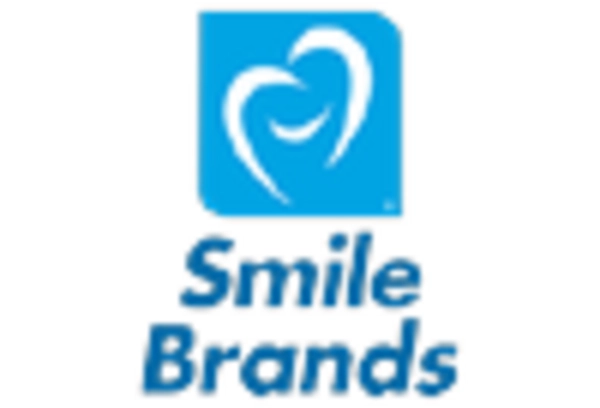Increased Focus on Preventive Care
The dental services-organization market is witnessing a paradigm shift towards preventive care, driven by both patient demand and healthcare policies. In Germany, there is a growing emphasis on regular check-ups and early intervention to prevent more severe dental issues. This trend is reflected in the increasing number of patients opting for routine cleanings and screenings, which can reduce long-term treatment costs. Organizations that prioritize preventive care are likely to enhance patient retention and satisfaction, as they provide value through education and proactive health management. This focus on prevention may also align with broader public health initiatives aimed at reducing the incidence of dental diseases.
Rising Demand for Aesthetic Dentistry
the dental services-organization in Germany is experiencing a notable increase in demand for aesthetic dentistry. This trend is driven by a growing awareness of oral health and the desire for improved appearance among the population. According to recent data, approximately 30% of adults in Germany are seeking cosmetic dental procedures, which include teeth whitening, veneers, and orthodontics. This shift towards aesthetic treatments is influencing dental practices to expand their service offerings, thereby enhancing patient satisfaction and loyalty. As a result, organizations that adapt to these changing consumer preferences are likely to thrive in the competitive landscape of the dental services-organization market.
Regulatory Changes and Insurance Coverage
the dental services-organization in Germany is influenced by ongoing regulatory changes and adjustments in insurance coverage. Recent reforms have aimed to improve access to dental care and enhance the quality of services provided. For instance, changes in statutory health insurance policies have expanded coverage for preventive treatments, which may encourage more patients to seek dental care. Organizations that stay abreast of these regulatory developments are better positioned to adapt their services and pricing strategies accordingly. This responsiveness to regulatory changes can lead to increased patient trust and loyalty, ultimately benefiting the overall growth of the dental services-organization market.
Technological Advancements in Dental Care
The integration of advanced technologies in the dental services-organization market is transforming patient care and operational efficiency. Innovations such as digital imaging, CAD/CAM systems, and tele-dentistry are becoming increasingly prevalent in Germany. These technologies not only enhance diagnostic accuracy but also streamline treatment processes, leading to improved patient outcomes. For instance, the adoption of 3D printing in dental prosthetics has reduced production costs and time, making high-quality dental solutions more accessible. As dental organizations invest in these technologies, they are likely to gain a competitive edge in the market, attracting tech-savvy patients who prioritize modern care.
Aging Population and Increased Oral Health Needs
Germany's demographic shift towards an aging population is significantly impacting the dental services-organization market. With an estimated 22% of the population aged 65 and older, there is a corresponding rise in oral health issues such as periodontal disease and tooth loss. This demographic is more likely to require complex dental treatments, including implants and dentures. Consequently, dental organizations are adapting their services to cater to the specific needs of older patients, which may involve specialized training for practitioners and the development of tailored treatment plans. This trend suggests a growing market potential for organizations that focus on geriatric dental care.

















